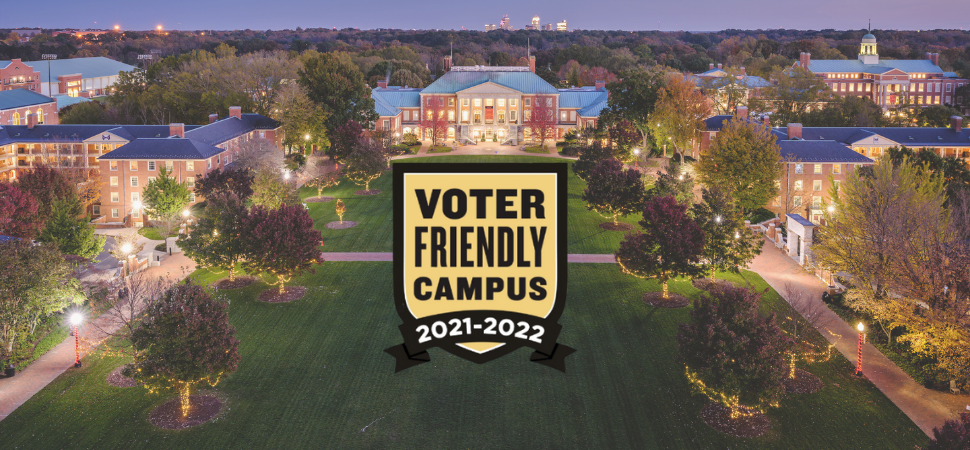Wake Forest University Joins Campuses Nationwide in Effort to be “Voter Friendly”
Today, Wake Forest University was named as one of over 231 campuses in 37 states and the District of Columbia to be designated as a “Voter Friendly Campus.” The initiative, led by national nonpartisan organizations Fair Elections Center’s Campus Vote Project (CVP) and NASPA – Student Affairs Administrators in Higher Education, held participating institutions accountable for planning and implementing practices that encourage their students to register and vote in 2020 elections and in the coming years.
The mission of the Voter Friendly Campus designation is to bolster efforts that help students overcome barriers to participating in the political process. Wake Forest was evaluated based on a campus plan about how it would register, educate, and turnout student voters in 2020, how it facilitated voter engagement efforts on campus, and a final analysis of its efforts- all in the face of the upheaval caused by a global pandemic. The designation is valid through December 2022.
In 2020, Wake Forest implemented several different initiatives through Deacs Decide, a highly collaborative, campus-wide political engagement project coordinated by the Office of Civic & Community Engagement.
Despite challenges surrounding the ongoing COVID-19 pandemic, Deacs Decide set up voter registration stations in partnership with several different offices and departments across campus. Those efforts resulted in registering 387 students to vote and reaching a 100% registration rate for Demon Deacon student-athletes through a collaborative effort with the WFU Athletics Department.
In addition to voter registration, Deacs Decide focused on voter education and engagement by coordinating with various faculty members, academic departments, and campus offices to develop informed voters through virtual and in-person programming. Over 12 panels or dialogues were conducted; a “Deacs Decide Canvas Commons Course,” featuring voter guides, election information, and more, was used in 25 different courses; and while students engaged in the democratic process by monitoring polls, phone banking, text banking or serving as a ballot defender.
When it came time for students to cast their ballots, Deacs Decide partnered with MTV +1tothePolls during the “one-stop” early voting period to create ‘March to the Polls’. The program joined forces with student organizations and campus figures to walk to the closest polling location each day during the early voting period, until in-person programming was canceled due to a change in campus operating status. On Election Day, complimentary, round-trip transportation was provided to all students between campus and their polling location. In addition, resources for processing election anxiety were made available to the campus community.
Wake Forest has made a strong statement about the civic mission of higher education to prepare students to be engaged participants in our democracy and is excited to continue engaging students in civic learning and democratic engagement. This is the first time that Wake Forest has been recognized as a Voter Friendly Campus; WFU joins 14 other campuses throughout the state of North Carolina to receive the designation for the 2021-22 year.
“The Voter Friendly Campus designation recognizes the hard work of so many individuals across campus who are working to mobilize student voters,” said Marianne Magjuka, executive director of the Office of Civic & Community Engagement and Deacs Decide co-chair. “In a short period of time, Deacs Decide has been able to align its efforts and build on previous successes to create a campus-wide focus on democratic engagement. It’s very exciting for our campus to receive this recognition.”
The institution’s designated Voter Friendly Campuses represent a wide range of two-year, four-year, public, private, rural, and urban campuses, Minority Serving Institutions, and Historically Black Colleges and Universities. According to the Center for Information and Research on Civic Learning and Engagement 52 – 55 percent of voting-eligible young people, ages 18-29, cast a ballot in the 2020 presidential election.

